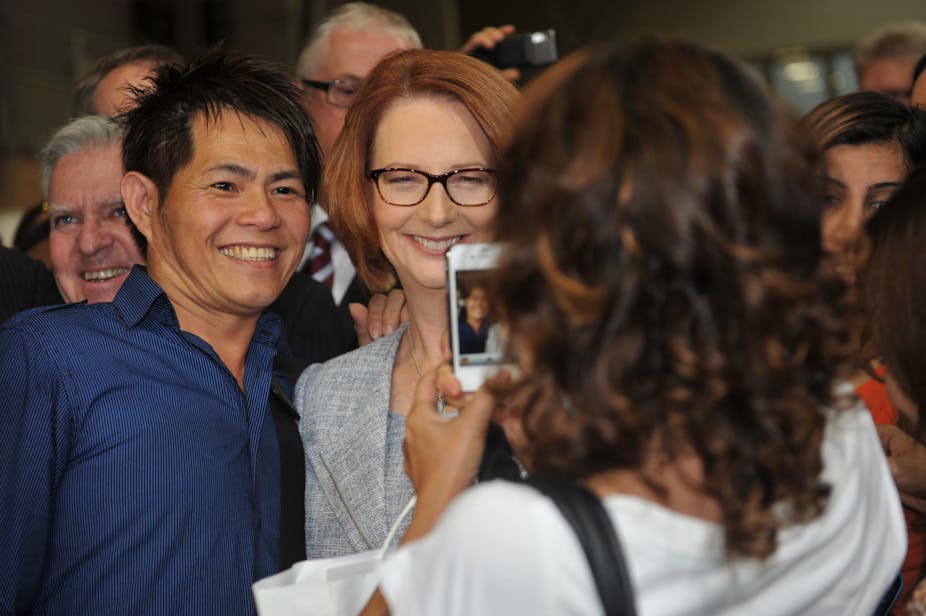The announcement that Prime Minister Julia Gillard would spend a week in the western suburbs of Sydney was greeted with mild amusement by some, and became the base of jokes about “beige rooms” for others.
It was an important visit, however, as opinion polls are indicating least ten federal seats in the area could be lost to the Liberals at the next election. Western Sydney seems to capture the imagination of the media – Howard’s Battlers that morphed into the Aspirational Classes - to this week’s attempt by Gillard to reclaim a “Labor Heartland’.
The reasons for this are complex, but I suspect that it is a microcosm of broader Australia: a multicultural region with a growing population, with long neglected infrastructure that is slowly choking the region. As I wrote recently, it captures both the best and most negative aspects of Australian society. As such, while there is much that is unique about western Sydney, it also acts as a mirror for the rest of the country.
The question then: how did Julia Gillard do on her journey way out west, and what will be the likely result?
Let’s begin with the good. The Prime Minister gave an inspiring speech on the opening night to the Labor faithful. She proved once again that she is eloquent and motivating in her delivery. Her approach showed no signs of the latest poll figures and her discussion about "quality of life” was something that would appeal to most of us.
There are elements of government policy that are popular with the electorate that the Gillard highlighted. Key here is the National Broadband Network, which while painfully slow in its rollout, is fundamental for the efficiency and the economic prosperity of a large sprawling city such as Sydney, not to mention the rest of the country.
Then there is the unavoidable bad. The bad also started on the very night of her opening speech when Gillard stated that the residents of Western Sydney were not “second class citizens”. I am not sure who inserted that line, but when it was heard, the reaction was “who said we are?”
Rightly or wrongly, the Abbott Opposition has framed the Gillard government as making policy on the run. Unfortunately for Gillard, two of the key announcements from the Rooty Hill sojourn appeared to confirm this.
The first was promise of a billion dollars worth of funding for the so-called Westconnex Link. It was a funding commitment made with conditions attached that surprised NSW Premier, Barry O’Farrell, who quickly described it as “back-of-the-envelope affair”.
O'Farrell quickly dismissed the idea and said his government would not support it – and as such it died a lonely death. There is no doubt that such an infrastructure project is fundamental for the region, but these things are always years off and the region needs relief from congestion immediately. The announcement failed to be accompanied by a more integrated transport plan in both the short and long term, something that is not possible without broader consultation. But as a region that has seen many such plans come and go, it was not surprising that this did not have much traction.

The second such policy announcement was the focus on new gun and anti-gang laws. The promise of a $64 million anti-gang taskforce was encased in a description of soaring gun crime and gangs out of control. While gun crime is a problem in specific sections of western Sydney, it was one of those generalisations that people make about the region that is all too often repudiated.
It was not surprising that the PM’s announcement would put offside three conservative premiers, it was when NSW Bureau of Crime Statistics director Don Weatherburn, stated that claims that shootings have “soared”. The plan began to unravel when Dr Weatherburn, stated that the non-fatal shooting offences in NSW had peaked in 2001 and then began to fall.
Now to the ugly – and this was elegantly captured by Michelle Grattan earlier this week. Grattan noted that both the Prime Minister and Opposition Leader have started courting xenophobic attitudes.
Just how ugly this was became evident when the most enthusiastic supporter of the announcement was Pauline Hanson.
While any system is open to abuse, when pushed Gillard could not provide specific information regarding such instances or discrimination against Australian workers.
The Prime Minister’s trip to Western Sydney was important – as it would have been if she announced an extended stay in any region of Australia. Like the western suburbs of Sydney, each region has its own specific challenges and being exposed to them can only break down barriers that have emerged between politicians and the everyday experiences of the Australian public.
The problem for the Prime Minister, however, is that this trip happened after she had announced the longest election campaign in Australian history.
It has been seen as an election stunt, and this has clouded the aims of her trip. Unfortunately, a great opportunity for all involved was lost amongst the roadshow and media circus that followed.

